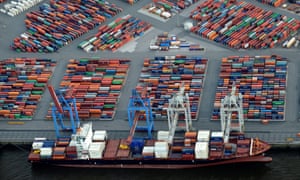Brexit will have an impact on the global economy, not just the UK. Photograph: Fabian Bimmer/Reuters
The singular issue of Brexit has consumed the United Kingdom for two-and-a-half years. The “if”, “how” and “when” of the country’s withdrawal from the European Union, after decades of membership, has understandably dominated news coverage, and sidelined almost every other policy debate. Lost in the mix, for example, has been any serious discussion of how the UK should boost productivity and competitiveness at a time of global economic and financial fluidity.
At the same time, the rest of the world’s interest in Brexit has understandably waned. The UK’s negotiations with the EU have dragged on through multiple déjà vu moments, and the consensus is that the economic fallout will be felt far more acutely in Britain than in the EU, let alone in countries elsewhere.
Still, the rest of the world is facing profound challenges of its own. Political and economic systems are undergoing far-reaching structural changes, many of them driven by technology, trade, climate change, high inequality and mounting political anger. In addressing these issues, policymakers around the world would do well to heed the lessons of the UK’s Brexit experience.
The singular issue of Brexit has consumed the United Kingdom for two-and-a-half years. The “if”, “how” and “when” of the country’s withdrawal from the European Union, after decades of membership, has understandably dominated news coverage, and sidelined almost every other policy debate. Lost in the mix, for example, has been any serious discussion of how the UK should boost productivity and competitiveness at a time of global economic and financial fluidity.
At the same time, the rest of the world’s interest in Brexit has understandably waned. The UK’s negotiations with the EU have dragged on through multiple déjà vu moments, and the consensus is that the economic fallout will be felt far more acutely in Britain than in the EU, let alone in countries elsewhere.
Still, the rest of the world is facing profound challenges of its own. Political and economic systems are undergoing far-reaching structural changes, many of them driven by technology, trade, climate change, high inequality and mounting political anger. In addressing these issues, policymakers around the world would do well to heed the lessons of the UK’s Brexit experience.
When Britons voted by a margin of 51.9% to 48.1% to leave the EU, the decision came as a shock to experts, pundits and Conservative and Labour party leaders alike. They had underappreciated the role of “identity” as a driving force behind the June 2016 referendum. But now, voters’ deeply held ideas about identity, whether real or perceived, can no longer be dismissed. Though today’s disruptive politics are fuelled by economic disappointment and frustration, identity is the tip of the spear. It has exposed and deepened political and social divisions that are as uncomfortable as they are intractable.
Experts also predicted that the UK economy would suffer an immediate and significant fall in output following the 2016 referendum. In the event, they misunderstood the dynamics of what economists call a “sudden stop” – that is, abrupt, catastrophic dysfunction in a key sector of the economy. A perfect example is the 2008 global financial crisis, when financial markets seized up as a result of operational dislocations and a loss of mutual confidence in the payments and settlement system.
Brexit was different. Because you cannot replace something with nothing, there was no immediate break in British-EU trade. In the absence of clarity on what type of Brexit would ultimately materialise, the economic relationship simply continued “as is,” and an immediate disruption was averted.
It turns out that when making macroeconomic and market projections for Brexit so far, “short versus long” has been more important than “soft versus hard” (with “hard” referring to the UK’s full, and most likely disorderly, withdrawal from the European single market and customs union). The question is not whether the UK will face a considerable economic reckoning, but when.
Nonetheless, the UK economy is already experiencing slow-moving structural change. There is evidence of falling foreign investment and this is contributing to the economy’s disappointing level of investment overall. Moreover, this trend is accentuating the challenges associated with weak productivity growth.
There are also signs that companies with UK-based operations have begun to trigger their Brexit contingency plans after a prolonged period of waiting, planning, and more waiting. In addition to shifting investments out of the UK, firms will also start to relocate jobs. And this process will likely accelerate even if Theresa May manages to get her proposed exit deal through parliament.
The Brexit process thus showcases the risks associated with economic and political fragmentation, and provides a preview of what awaits an increasingly fractured global economy if this continues: namely, less efficient economic interactions, less resilience, more complicated cross-border financial flows, and less agility. In this context, costly self-insurance will come to replace some of the current system’s pooled-insurance mechanisms. And it will be much harder to maintain global norms and standards, let alone pursue international policy harmonisation and coordination.
Tax and regulatory arbitrage are likely to become increasingly common as well. And economic policymaking will become a tool for addressing national security concerns (real or imagined). How this approach will affect existing geopolitical and military arrangements remains to be seen.
Lastly, there will also be a change in how countries seek to structure their economies. In the past, Britain and other countries prided themselves as “small open economies” that could leverage their domestic advantages through shrewd and efficient links with Europe and the rest of the world. But now, being a large and relatively closed economy might start to seem more attractive. And for countries that do not have that option – such as smaller economies in east Asia – tightly knit regional blocs might provide a serviceable alternative.
The messiness of British party politics has made the Brexit process look like a domestic dispute that is sometimes inscrutable to the rest of the world. But Brexit holds important lessons for and about the global economy. Gone are the days when accelerating economic and financial globalisation and correlated growth patterns went almost unquestioned. We are also in an era of considerable technological and political fluidity. The outlooks for growth and liquidity will likely become even more uncertain and divergent than they already are.


